|
|
|
Sort Order |
|
|
|
Items / Page
|
|
|
|
|
|
|
| Srl | Item |
| 1 |
ID:
131507


|
|
|
|
|
| Publication |
2014.
|
| Summary/Abstract |
Two parallel norms mandate an international duty to hold state leaders individually accountable for serious corruption and human rights crimes. The development of these new norms is poorly explained by realist and neoliberal perspectives, but there are also weaknesses in recent constructivist explanations of norm diffusion that emphasize agency at the expense of structure. Such approaches have difficulty explaining the source of and similarities between new norms, and treat norm entrepreneurs as prior to and separate from their environment. In contrast, drawing on sociological institutionalism, we present a more structural explanation of individual accountability norms. The norms derive from an overarching modernist world culture privileging individual rights and responsibilities, as well as rational-legal authority. This culture is more generative of norm entrepreneurs than generated by them. The specific norms are instantiated through a process of "theorization" within permissive post-Cold War conditions, and diffused via mimicry, professionalization, and coercive isomorphism
|
|
|
|
|
|
|
|
|
|
|
|
|
|
|
|
| 2 |
ID:
131492
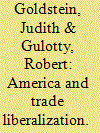

|
|
|
|
|
| Publication |
2014.
|
| Summary/Abstract |
Among scholars, delegation of power to the US president in 1934 is widely believed to have been a necessary requisite for tariff reductions in ensuing years. According to conventional wisdom, delegation to the president sheltered Congress from constituent pressure thereby facilitating the opening of the US economy and the emergence of the United States as a world power. This article suggests a revision to our understanding of just how that occurred. Through a close study of the US tariff schedule between 1928 and 1964, focusing on highly protected products, we examine which products were subject to liberalization and at what time. After 1934, delegation led to a change in trade policy, not because Congress gave up their constitutional prerogative in this domain but because presidents were able to target the potential economic dislocation that derives from import competition to avoid the creation of a congressional majority willing to halt the trade agreements program.
|
|
|
|
|
|
|
|
|
|
|
|
|
|
|
|
| 3 |
ID:
131512
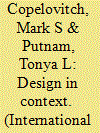

|
|
|
|
|
| Publication |
2014.
|
| Summary/Abstract |
This research note highlights an important element missing from rational design theories of international agreements: "institutional context"-the presence or absence of existing and prior agreements between prospective partners in "new" cooperation. If, as rational design theorists argue, agreement design is deliberate, strategic, and directed toward enhancing contracting parties' ability to credibly commit to future cooperation, then prior design "successes" should influence the terms of additional cooperation. We test for this omitted variable problem in three agreement design outcomes: ex ante limitations on agreement duration, exit clauses, and dispute-settlement provisions. Through an augmentation and reanalysis of data from a key study in the rational design literature-Barbara Koremenos's "Contracting Around International Uncertainty"-we show institutional context is positively correlated with inclusion of ex ante time limitations in negotiated agreements and negatively correlated with the inclusion of exit clauses and third-party dispute-settlement provisions. Institutional context also mediates and conditions the effects of the explanatory variable at the heart of existing rational design theories-uncertainty about the future distribution of gains from cooperation. Our findings show that the collective appeal of particular design features varies not only with the nature of underlying strategic problems, but also with degrees of shared institutional context.
|
|
|
|
|
|
|
|
|
|
|
|
|
|
|
|
| 4 |
ID:
131503
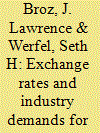

|
|
|
|
|
| Publication |
2014.
|
| Summary/Abstract |
The recent confrontation between China and the United States over currency policy illustrates a broader phenomenon: exchange-rate misalignments tend to spill over into trade policy. Although previous studies have shown that aggregate protectionist activity is positively related to the level of the real effective exchange rate, we explore this relationship at the industry level. Several industry-specific characteristics determine the protectionist response to exchange rate changes, including the degree of exchange-rate pass-through, the level of import penetration, and the share of imported intermediate inputs in total industry inputs. We find that the marginal effect of currency appreciation on the number of industry-level antidumping petitions is positive and significant only for industries with high pass-through. Therefore, exchange rates appear to induce demands for trade barriers only in industries where competitiveness is directly harmed by currency appreciation.
|
|
|
|
|
|
|
|
|
|
|
|
|
|
|
|
| 5 |
ID:
131511


|
|
|
|
|
| Publication |
2014.
|
| Summary/Abstract |
Through a series of focus groups with human security practitioners, we examined how powerful organizations at the center of advocacy networks select issues for attention. Participants emphasized five sets of factors: entrepreneur attributes, adopter attributes, the broader political context, issue attributes, and intranetwork relations. However, the last two were much more consistently invoked by practitioners in their evaluations of specific candidate issues. Scholars of global agenda setting should pay particular attention to how intranetwork relations structure gatekeeper preferences within transnational advocacy spaces because these help constitute perceptions of issues' and actors' attributes in networks.
|
|
|
|
|
|
|
|
|
|
|
|
|
|
|
|
| 6 |
ID:
131498
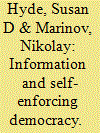

|
|
|
|
|
| Publication |
2014.
|
| Summary/Abstract |
This article argues that when democracy is not yet institutionalized, leaders have little incentive to push for clean elections, in part because they are likely to face accusations of fraud from domestic opposition groups regardless of their true behavior. Reputable international election observers can facilitate self-enforcing democracy by providing credible information about the quality of elections, thus increasing citizens' ability to coordinate against the regime when election fraud occurs, and discrediting "sore loser" protests. Patterns of postelection protests are consistent with the argument, including that postelection protests are more likely and last longer following negative reports from international observers. International election observers help promote democracy by making postelection protest more accurate in the short term, thereby increasing incentives for leaders to hold democratic elections in the long term.
|
|
|
|
|
|
|
|
|
|
|
|
|
|
|
|
| 7 |
ID:
131496
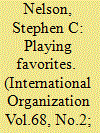

|
|
|
|
|
| Publication |
2014.
|
| Summary/Abstract |
International organizations (IOs) suffuse world politics, but the International Monetary Fund (IMF) stands out as an unusually important IO. My research suggests that IMF lending is systematically biased. Preferential treatment is largely driven by the degree of similarity between beliefs held by IMF officials and key economic policy-makers in the borrowing country. This article describes the IMF's ideational culture as "neoliberal," and assumes it to be stable during the observation window (1980-2000). The beliefs of top economic policy-makers in borrowing countries, however, vary in terms of their distance from IMF officials' beliefs. When fellow neoliberals control the top economic policy posts the distance between the means of the policy team's beliefs and the IMF narrows; consequently, IMF loans become less onerous, more generous, and less rigorously enforced. I gathered data on the number of conditions and the relative size of loans for 486 programs in the years between 1980 and 2000. I collected data on waivers, which allow countries that have missed binding conditions to continue to access funds, as an indicator for enforcement. I rely on indirect indicators, gleaned from a new data set that contains biographical details of more than 2,000 policy-makers in ninety developing countries, to construct a measure of the proportion of the top policy officials that are fellow neoliberals. The evidence from a battery of statistical tests reveals that as the proportion of neoliberals in the borrowing government increases, IMF deals get comparatively sweeter.
|
|
|
|
|
|
|
|
|
|
|
|
|
|
|
|
| 8 |
ID:
131501
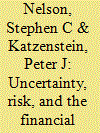

|
|
|
|
|
| Publication |
2014.
|
| Summary/Abstract |
The distinction between uncertainty and risk, originally drawn by Frank Knight and John Maynard Keynes in the 1920s, remains fundamentally important today. In the presence of uncertainty, market actors and economic policy-makers substitute other methods of decision making for rational calculation-specifically, actors' decisions are rooted in social conventions. Drawing from innovations in financial markets and deliberations among top American monetary authorities in the years before the 2008 crisis, we show how economic actors and policy-makers live in worlds of risk and uncertainty. In that world social conventions deserve much greater attention than conventional IPE analyses accords them. Such conventions must be part of our toolkit as we seek to understand the preferences and strategies of economic and political actors.
|
|
|
|
|
|
|
|
|
|
|
|
|
|
|
|
|
|
|
|
|